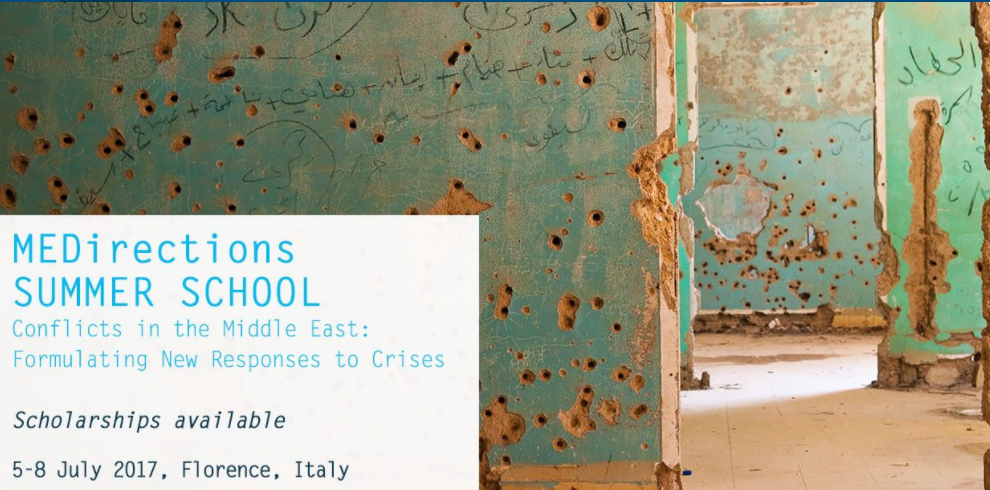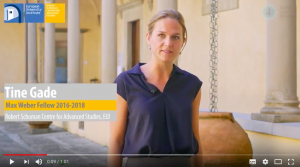The Middle East Directions Programme in collaboration with the School of Transnational Governance (EUI) organised the Summer School 2017 entitled “Conflicts in the Middle East: Formulating new responses to crises”, Florence, 5-8 July 2017
Overview
The four-day summer school addressed some of the main factors of crises facing the MENA region and provides a critical analysis of current policy responses. Researchers with up-to-date empirical knowledge of conflict and crises areas engaged directly with stakeholders working on these issues. They reflected together on the new dynamics and actors that are transforming the region, on the links between local dynamics and broader trans-national trends and on possible policy options.
The Summer School follows a multi-disciplinary approach, combining both the academic expertise and the policy experience of the MEDirections research team. The training group also included external experts from the world of practice.
The Summer School welcomed practitioners working in the field of conflict prevention and resolution, mediation, prevention of violent extremism and humanitarian assistance. It is directed at government, EU Institutions and international organisations officials, as well as to practitioners from the private sector and NGOs.
Methodology
The programme of the Summer School established linkages between the analysis and the practice, through training sessions which combine:
Analytical modules led by well-known academics and researchers together with local actors and practitioners. The objective was to provide the participants with a deep analysis of topics that are crucial for understanding the region and to discuss the policies designed to tackle them.
Practical modules where the participants were encouraged to reflect on and imagine policy responses through different types of case studies and simulations.
Main issues addressed
Armed conflicts and violent radicalisation, sectarianism, the crisis of state institutions are key factors which are transforming the Middle East and North Africa region (MENA). They have a profound impact on societies and on the regional order, and consequences at the international level. Effective policy responses need to be based on thorough understanding of these phenomena. Throughout the Summer School, participants had the opportunity to address these crucial issues:
Understanding and preventing violent radicalisation
Over the past few years, many Arab countries have been witnessing a new wave of violent radicalisation among the youth, as it is the case in Egypt, Iraq, Syria and Tunisia. This phenomenon does not concern only Sunni communities, but it also affects Shia, Kurdish and Christian communities. Formuating policies to prevent violent radicalisation requires an understanding of its characterisitics and root-causes, as well as its different paths in different countries of the region and the factors that shape them.
Addressing religious sectarianism
The sectarian tensions between Christian and Muslim communities, as is the case in Egypt, or between Sunnis and Shi’as as is the case in Iraq, have deep impact on the future of the region. Addressing this challenge requires an analysis of the causes of religious and sectarian tensions, and the dynamics between regional actors, namely Iran and Saudi Arabia and local religious and political actors, as well as of the role that diplomacy, religious actors and civil society actors can play to address this challenge.
Understanding new dynamics of governance
The decline of central-state institutions and the rise of new forms of governance underlines the need for both regional and international actors to develop new tools to deal with sub-state actors that are now an essential player in Middle Eastern and North African politics. To do so, a deep understanding is needed of these new models of governance, their political economy, and how competition between local actors and with the central state institutions over hegemony, as illustrated by the case of border control, for example.
Objectives
By the end of the Summer School, the participants:
- Have been introduced to some of the most recent analyses and first-hand research on the key dynamics transforming the Middle East and North Africa.
- Have been able to discuss policies and practical experiences in the field with researchers and practitioners with up-to-date, first-hand knowledge of the MENA region.
- Have reflected on how to design more effective policy responses and initiatives based on a critical understanding of current developments on the ground.
PRACTICAL INFORMATION




